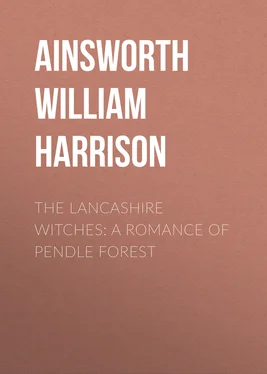William Ainsworth - The Lancashire Witches - A Romance of Pendle Forest
Здесь есть возможность читать онлайн «William Ainsworth - The Lancashire Witches - A Romance of Pendle Forest» — ознакомительный отрывок электронной книги совершенно бесплатно, а после прочтения отрывка купить полную версию. В некоторых случаях можно слушать аудио, скачать через торрент в формате fb2 и присутствует краткое содержание. Жанр: foreign_prose, literature_19, Европейская старинная литература, на английском языке. Описание произведения, (предисловие) а так же отзывы посетителей доступны на портале библиотеки ЛибКат.
- Название:The Lancashire Witches: A Romance of Pendle Forest
- Автор:
- Жанр:
- Год:неизвестен
- ISBN:нет данных
- Рейтинг книги:5 / 5. Голосов: 1
-
Избранное:Добавить в избранное
- Отзывы:
-
Ваша оценка:
- 100
- 1
- 2
- 3
- 4
- 5
The Lancashire Witches: A Romance of Pendle Forest: краткое содержание, описание и аннотация
Предлагаем к чтению аннотацию, описание, краткое содержание или предисловие (зависит от того, что написал сам автор книги «The Lancashire Witches: A Romance of Pendle Forest»). Если вы не нашли необходимую информацию о книге — напишите в комментариях, мы постараемся отыскать её.
The Lancashire Witches: A Romance of Pendle Forest — читать онлайн ознакомительный отрывок
Ниже представлен текст книги, разбитый по страницам. Система сохранения места последней прочитанной страницы, позволяет с удобством читать онлайн бесплатно книгу «The Lancashire Witches: A Romance of Pendle Forest», без необходимости каждый раз заново искать на чём Вы остановились. Поставьте закладку, и сможете в любой момент перейти на страницу, на которой закончили чтение.
Интервал:
Закладка:
Mistress Nutter might be a year or two turned of forty, but she still retained a very fine figure, and much beauty of feature, though of a cold and disagreeable cast. She was dressed in mourning, though her husband had been dead several years, and her rich dark habiliments well became her pale complexion and raven hair. A proud poor gentleman was Richard Nutter, her late husband, and his scanty means not enabling him to keep up as large an establishment as he desired, or to be as hospitable as his nature prompted, his temper became soured, and he visited his ill humours upon his wife, who, devotedly attached to him, to all outward appearance at least, never resented his ill treatment. All at once, and without any previous symptoms of ailment, or apparent cause, unless it might be over-fatigue in hunting the day before, Richard Nutter was seized with a strange and violent illness, which, after three or four days of acute suffering, brought him to the grave. During his illness he was constantly and zealously tended by his wife, but he displayed great aversion to her, declaring himself bewitched, and that an old woman was ever in the corner of his room mumbling wicked enchantments against him. But as no such old woman could be seen, these assertions were treated as delirious ravings. They were not, however, forgotten after his death, and some people said that he had certainly been bewitched, and that a waxen image made in his likeness, and stuck full of pins, had been picked up in his chamber by Mistress Alice and cast into the fire, and as soon as it melted he had expired. Such tales only obtained credence with the common folk; but as Pendle Forest was a sort of weird region, many reputed witches dwelling in it, they were the more readily believed, even by those who acquitted Mistress Nutter of all share in the dark transaction.
Mistress Nutter gave the best proof that she respected her husband's memory by not marrying again, and she continued to lead a very secluded life at Rough Lee, a lonesome house in the heart of the forest. She lived quite by herself, for she had no children, her only daughter having perished somewhat strangely when quite an infant. Though a relative of the Asshetons, she kept up little intimacy with them, and it was a matter of surprise to all that she had been drawn from her seclusion to attend the present revel. Her motive, however, in visiting the Abbey, was to obtain the assistance of Sir Ralph Assheton, in settling a dispute between her and Roger Nowell, relative to the boundary line of part of their properties which came together; and this was the reason why the magistrate had been invited to Whalley. After hearing both sides of the question, and examining plans of the estates, which he knew to be accurate, Sir Ralph, who had been appointed umpire, pronounced a decision in favour of Roger Nowell, but Mistress Nutter refusing to abide by it, the settlement of the matter was postponed till the day but one following, between which time the landmarks were to be investigated by a certain little lawyer named Potts, who attended on behalf of Roger Nowell; together with Nicholas and Richard Assheton, on behalf of Mistress Nutter. Upon their evidence it was agreed by both parties that Sir Ralph should pronounce a final decision, to be accepted by them, and to that effect they signed an agreement. The three persons appointed to the investigation settled to start for Rough Lee early on the following morning.
A word as to Master Thomas Potts. This worthy was an attorney from London, who had officiated as clerk of the court at the assizes at Lancaster, where his quickness had so much pleased Roger Nowell, that he sent for him to Read to manage this particular business. A sharp-witted fellow was Potts, and versed in all the quirks and tricks of a very subtle profession—not over-scrupulous, provided a client would pay well; prepared to resort to any expedient to gain his object, and quite conversant enough with both practice and precedent to keep himself straight. A bustling, consequential little personage was he, moreover; very fond of delivering an opinion, even when unasked, and of a meddling, make-mischief turn, constantly setting men by the ears. A suit of rusty black, a parchment-coloured skin, small wizen features, a turn-up nose, scant eyebrows, and a great yellow forehead, constituted his external man. He partook of the hospitality at the Abbey, but had his quarters at the Dragon. He it was who counselled Roger Nowell to abide by the decision of Sir Ralph, confidently assuring him that he must carry his point.
This dispute was not, however, the only one the knight had to adjust, or in which Master Potts was concerned. A claim had recently been made by a certain Sir Thomas Metcalfe of Nappay, in Wensleydale, near Bainbridge, to the house and manor of Raydale, belonging to his neighbour, John Robinson, whose lady, as has been shown, was a relative of the Asshetons. Robinson himself had gone to London to obtain advice on the subject, while Sir Thomas Metcalfe, who was a man of violent disposition, had threatened to take forcible possession of Raydale, if it were not delivered to him without delay, and to eject the Robinson family. Having consulted Potts, however, on the subject, whom he had met at Read, the latter strongly dissuaded him from the course, and recommended him to call to his aid the strong arm of the law: but this he rejected, though he ultimately agreed to refer the matter to Sir Ralph Assheton, and for this purpose he had come over to Whalley, and was at present a guest at the vicarage. Thus it will be seen that Sir Ralph Assheton had his hands full, while the little London lawyer, Master Potts, was tolerably well occupied. Besides Sir Thomas Metcalfe, Sir Richard Molyneux, and Mr. Parker of Browsholme, were guests of Dr. Ormerod at the vicarage.
Such was the large company assembled to witness the May-day revels at Whalley, and if harmonious feelings did not exist amongst all of them, little outward manifestation was made of enmity. The dresses and appointments of the pageant having been provided by Sir Ralph Assheton, who, Puritan as he was, encouraged all harmless country pastimes, it was deemed necessary to pay him every respect, even if no other feeling would have prompted the attention, and therefore the troop had stopped on seeing him and his guests issue from the Abbey gate. At pretty nearly the same time Doctor Ormerod and his party came from the vicarage towards the green.
No order of march was observed, but Sir Ralph and his lady, with two of his children by the former marriage, walked first. Then came some of the other ladies, with the Rector of Middleton, John Braddyll, and the two sons of Mistress Robinson. Next came Mistress Nutter, Roger Nowell and Potts walking after her, eyeing her maliciously, as her proud figure swept on before them. Even if she saw their looks or overheard their jeers, she did not deign to notice them. Lastly came young Richard Assheton, of Middleton, and Squire Nicholas, both in high spirits, and laughing and chatting together.
"A brave day for the morris-dancers, cousin Dick," observed Nicholas Assheton, as they approached the green, "and plenty of folk to witness the sport. Half my lads from Downham are here, and I see a good many of your Middleton chaps among them. How are you, Farmer Tetlow?" he added to a stout, hale-looking man, with a blooming country woman by his side—"brought your pretty young wife to the rush-bearing, I see."
"Yeigh, squoire," rejoined the farmer, "an mightily pleased hoo be wi' it, too."
"Happy to hear if, Master Tetlow," replied Nicholas, "she'll be better pleased before the day's over, I'll warrant her. I'll dance a round with her myself in the hall at night."
"Theere now, Meg, whoy dunna ye may t' squoire a curtsy, wench, an thonk him," said Tetlow, nudging his pretty wife, who had turned away, rather embarrassed by the free gaze of the squire. Nicholas, however, did not wait for the curtsy, but went away, laughing, to overtake Richard Assheton, who had walked on.
Читать дальшеИнтервал:
Закладка:
Похожие книги на «The Lancashire Witches: A Romance of Pendle Forest»
Представляем Вашему вниманию похожие книги на «The Lancashire Witches: A Romance of Pendle Forest» списком для выбора. Мы отобрали схожую по названию и смыслу литературу в надежде предоставить читателям больше вариантов отыскать новые, интересные, ещё непрочитанные произведения.
Обсуждение, отзывы о книге «The Lancashire Witches: A Romance of Pendle Forest» и просто собственные мнения читателей. Оставьте ваши комментарии, напишите, что Вы думаете о произведении, его смысле или главных героях. Укажите что конкретно понравилось, а что нет, и почему Вы так считаете.












